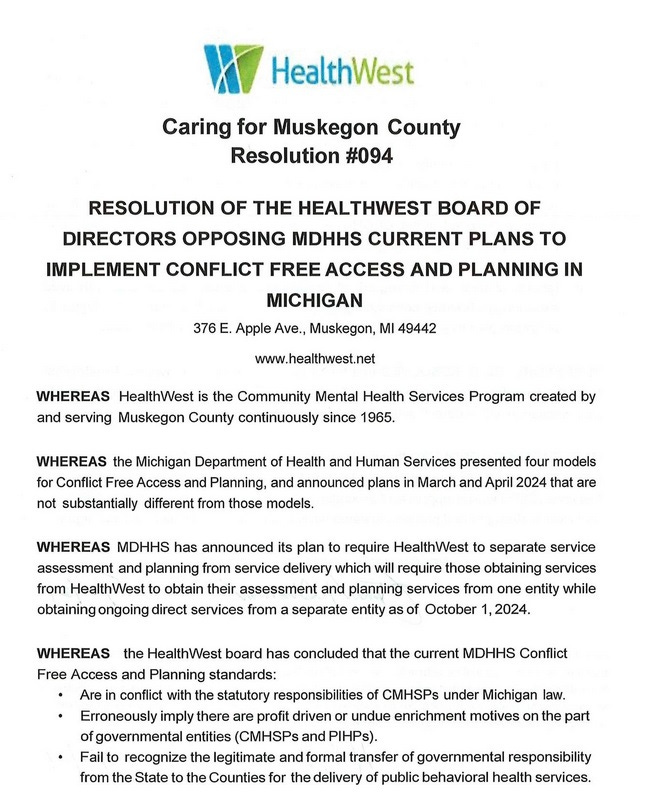The Michigan Department of Health and Human Services (MDHHS) has issued a requirement for community mental health (CMH) organizations to implement Conflict Free Access and Planning in their Medicaid-funded mental health services. According to Michigan.gov,
“Conflict-Free Access and Planning (CFA&P) requires that assessment and coordination of services are separate from the delivery of services. This means that case management and support coordination activities are separate from the delivery of services.
The goal of CFA&P is to promote choice and independence for people receiving services. Your planning process should not be influenced by provider’s self-interests.”
While there are obvious benefits to Conflict-Free Access and Planning, there are also drawbacks. For example, under a conflict-free system as outlined by MDHHS, individuals and families receiving services will have to tell their story at least three times and interact with at least three separate organizations. This means more complicated system navigation. Additionally, people with mental illness (MI) have different needs than people with intellectual and developmental disabilities (IDD). In some cases, it is imperative to receive prompt service. Also, it is both efficient and seamless for consumers to receive treatment from the entity that creates the treatment plan. To confuse matters even more, and contrary to the MDHHS direction on CMH conflict-free philosophy, MDHHS requires one entity to provide this same range of services under the CMH-run Certified Community Behavioral Health Clinic (CCBHC).
During the June 28, 2024, Community Mental Health Ottawa County (CMHOC) meeting CMH Interim Executive Director, Dr. Michael Brashears commented, “So, the MI [mental illness] side, the person who is developing the person-centered treatment is not the same person who can deliver the service. [] It’s a fundamental threat to clinical best practice.”
Dr. Brashears also stated, (14:40) “I support, and we support conflict-free access and planning. What we’re going to have difficulty supporting is [] the state’s methodology.” He later clarified some of the ways it will affect CMHOC. (1:41:20) “If this gets implemented the way the state wants, all of our directly operated people, [] we have to choose between are we going to do access, or access department, or be a provider. It forces us to not have an access department. It forces us to not be in the part of treatment planning of the person-centered planning processing.”
Dr. Brashears suggested the board push back on the state’s requirement by passing a resolution opposing the state’s methodology for implementing Conflict-Free Access and Planning similar to the resolution passed by Health West, the CMH organization for Muskegon County.
CMH board member Steven Rockman questioned, (2:00:00) “Just so I understand this, the legislature has completely delegated all authority of this to the Department of Health and Human Services? The rule making process; [] there is no oversight whatsoever?; leaving no way to challenge this through the rule making process?, or judicial?, just outright rebellion?” Community Mental Health Association of Michigan, (CMHAM) Associate Director Alan Bolter confirmed Rockman’s understanding of the situation. (1:57:20) “There is no legislative oversight at all. [] They have never had any oversight over this. [] The only power they have is approving the budget.”
There appears to be several parallels between MDHHS requiring CMH’s to implement Conflict Free Access and Planning and several cases working their way through the American legal system that involve government regulatory agencies creating sudo-legislation through their policies. Currently, the Supreme Court is considering whether the Environmental Protection Agency (EPA) can issue rules which govern air pollution requirements of power plants and industrial facilities, and on June 28, 2024 the Supreme Court reversed a precedent known as Chevron, which gave regulatory agencies the ability to create policies according to their interpretation of the law.
In discussing the state’s contradiction between the MDHSS CMH conflict-free philosophy and services provided under CCBHC, CMHAM Associate Director Bolter pointed out, “Under CCBHC requirements, one of the requirements is, you have to do both the access and planning, and provide the services; you cannot separate those out.” He continued speaking about various state initiatives intended to address mental health concerns including, CCBHC, Michi-Cans, and help phones. (1:43:00) “You have these different entities that are working within the Michigan Department of Health and Human Services, that aren’t necessarily working or talking together; that have different requirements, different regulations; none of which line up with conflict-free access and planning; which is causing tremendous amounts of confusion.”
Dr. Brashears added, (21:03) “From a state issue, we have a movement to deal with conflict-free, and a budget that doesn’t actually support the activities.”
The current deadline from MDHHS for CMH’s to implement conflict free access and planning is October 1, 2024. This requirement could have significant consequences for CMHOC and the residents of Ottawa County, and it is not yet clear how it will be resolved.

